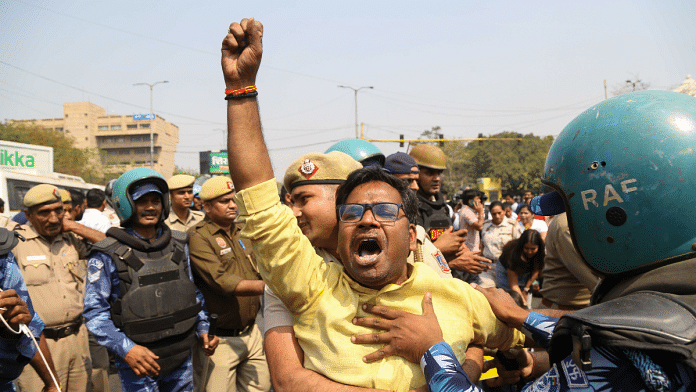New Delhi: “Who will run Delhi?” — this is the question on everyone’s mind after Chief Minister and Aam Aadmi Party (AAP) National Convener Arvind Kejriwal was arrested by the Enforcement Directorate (ED) Thursday night in the alleged liquor policy scam.
The ED, which took in Kejriwal after hours of interrogation at his residence, has accused the ruling AAP of providing undue benefits to liquor vendor licensees in lieu of “kickbacks” and “commissions”, which were allegedly used by the party in the Punjab and Goa elections.
Earlier Thursday, the Delhi High Court had refused to grant Kejriwal interim protection from coercive action, thereby paving the way for his arrest.
‘Not often that a sitting CM is arrested’
Constitutional expert and former Lok Sabha Secretary General P.D.T. Achary pointed out the lack of rules or laws for such a situation. He told ThePrint: “It is not often that a sitting chief minister is arrested. If it does happen, then the chief minister himself has to designate someone to preside over Cabinet meetings and take important decisions.”
“The second way is that, of course, the chief minister can resign, as has happened in Jharkhand,” he added, referring to Jharkhand Mukti Morcha (JMM) leader Hemant Soren, who was arrested on 31 January, for alleged land fraud. Before his arrest, however, Soren had resigned as Jharkhand chief minister, after which he was taken to the ED office.
Former Supreme Court judge, Justice M.B. Lokur said that “constitutional morality requires that he (Kejriwal) should resign”.
“Ordinarily, one would expect some time (an hour) or so for the CM to resign, as happened in Jharkhand. A successor can then take over,” he explained, adding that, “If time is not given, then a CM is arrested.” He called this “unprecedented”, and said, “If the CM chooses not to resign, so be it.”
‘Constitution is silent’
Senior advocate Rakesh Dwivedi pointed out that the Constitution doesn’t specifically state what should happen when a CM is arrested and has not named a successor.
However, in his opinion, a chief minister working from jail would amount to a Constitutional breakdown. “The government headed by the chief minister is collectively responsible to the House. If the chief minister cannot attend the House without naming anybody, then there is clearly a breakdown,” he said, adding that AAP has no option but to elect someone who can be the CM.
Dwivedi also mentioned the new law — Government of National Capital Territory of Delhi (Amendment) Act 2023 — which authorises the National Capital Civil Service Authority (NCCSA) to handle transfer and posting of bureaucrats in the national capital.
This body is headed by the elected chief minister of Delhi in addition to the chief secretary and the principal secretary of the home department. The Authority has to make recommendations to the Lieutenant Governor (L-G) regarding transfers and postings of officials and disciplinary matters.
“If the CM is missing, how will this committee function?” he asked.
Echoing Lokur, Dwivedi said the core issue was of Constitutional morality or public morality. “Once you are arrested with respect to a matter where other people are arrested and denied bail, then you should relieve the post and nominate someone else,” the senior counsel added.
Former Vice-Chancellor of National Law University, Delhi, Professor Ranbir Singh also told ThePrint that there was no provision in the Constitution to deal with the impasse arising out of a sitting chief minister’s arrest, and when he has not named a successor. “The Constitution is silent on many issues,” he said.
Singh, however, disagreed with Dwivedi that a sitting chief minister’s arrest would amount to the breakdown of Constitutional machinery.
“His office is still there. Yes, ideally Kejriwal should nominate his senior-most minister to take over the post. He, too, is creating trouble by not doing it,” Singh added.
‘Meetings from jail?’
Talking to ThePrint, Achary underlined the practical difficulties if the chief minister doesn’t want to designate anybody and doesn’t resign. “Someone will have to carry all the files to him etc. It will depend on the jail manual and (prison) rules… Cabinet meetings are confidential… You cannot have a confidential meeting when the CM is sitting in jail,” the Constitution expert said.
Achary asserted that “unless there is a conviction, nobody can ask him to vacate the office. If the CM is convicted of an offence and is disqualified, then of course he can’t remain the chief minister… but till then he remains the chief minister.”
Section 8 of the Representation of the People Act, 1951, provides for disqualification of a lawmaker for conviction in certain offences. It says a person sentenced to imprisonment for two years or more shall be disqualified “from the date of such conviction” and remain disqualified for another six years after serving time. However, this provision talks only about conviction and not arrest.
(Edited by Tikli Basu)



